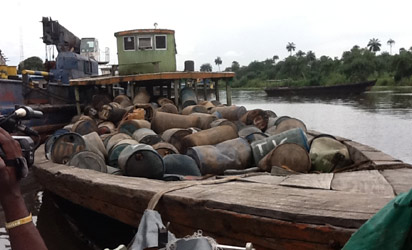The Nigerian Navy’s Forward Operating Base (FOB) in Igbokoda of Ondo State has made a significant breakthrough in the fight against oil theft, intercepting a boat carrying approximately 100,000 litres of stolen crude oil.
The operation took place at the Idiogba-Mahin coastline in Ilaje Local Government Area on Thursday
during an assessment visit to the site.
According to Capt. Aliyu Usman, Commanding Officer of the base, the Naval team acted on credible intelligence and swiftly deployed its Quick Response Team to intercept the wooden boat. The team found the boat loaded with stolen crude oil, as well as items used for bunkering activities, such as discharge hoses and pumping machines.
The perpetrators fled the scene upon sighting the Naval team, but the boat and its contents were secured.
A sample of the crude oil was taken for laboratory testing, and the boat and product were handled in accordance with existing directives.
“In the process, the team intercepted a large wooden boat laden with about 100,000 litres of stolen crude oil, alongside associated accessories such as discharge hoses and pumping machines.
“The perpetrators fled on sighting the Naval team, but the arrested boat was thereafter secured.
“Accordingly, a sample of the crude oil was taken for an appropriate laboratory test while the boat and the product were handled in line with extant directives,” Usman said.
This operation is a significant milestone in the Nigerian Navy’s efforts to combat oil theft and illegal bunkering activities.
The Navy has been working tirelessly to protect the country’s oil resources and prevent the environmental and economic damage caused by these illegal activities.
Persecondnews recalls that In September 2024, the Navy arrested eight suspected oil thieves and destroyed illegal refineries around Brass River.
The Nigerian Navy’s efforts have also extended to sensitizing local communities about the dangers of hosting illegal bunkering activities.
Residents of the Idiogba-Mahin coastline were recently educated on the potential threats to their security and environment posed by these activities.
























Leave a comment